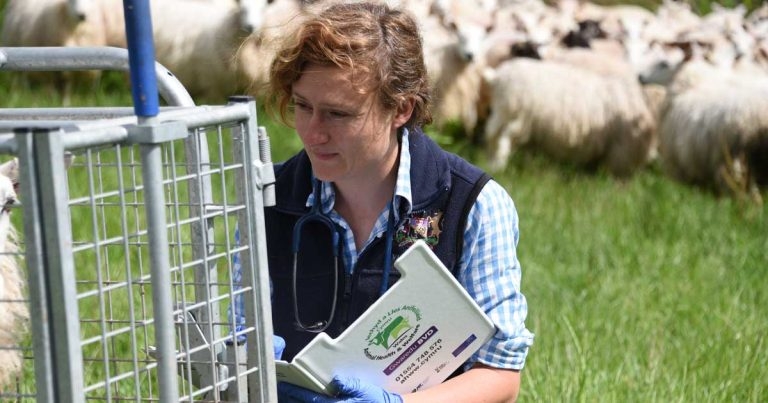11 Oct 2022
Lucy Sullivan, BSc(Hons), BVetMed, MRCVS, a farm animal vet, discusses the Stoc+ Project.

Farm vet Lucy Sullivan.
A Welsh project working with farmers and vets to promote proactive flock and herd health management is helping create a blueprint for animal welfare, sustainability and efficiency.
The Stoc+ Project, led by Hybu Cig Cymru (HCC), is one strand of the Red Meat Development Programme – a five-year Welsh Government and European Union-funded initiative.
As part of its remit, Stoc+ provides valuable post-qualification training and mentoring to young vets across Wales, helping build confidence and affording opportunities for continuing professional development.
Carmarthenshire vet Lucy Sullivan qualified in 2020 and she has taken up a post with Dyfed Farm Vets to specialise in farm animal veterinary medicine after starting off in mixed practice.
She has participated in Stoc+ for just over a year. During that time, Dr Sullivan has received support and practical advice to help tackle challenges she has faced in the field, and help develop her expertise and apply best practice in her animal health planning work.
An important feature of the support she has found is one-to-one access to a Stoc+ vet consultant. Dr Sullivan said: “This has given me access to specialists and experts in their field as colleagues to work alongside. I’ve found them to be always easily accessible and ready with answers.
“Mentoring and access to advice promote a feeling of support, which is absolutely critical to the development of young vets. Being part of positive practice culture and the wider veterinary community helps form multiple support networks, and promotes discussion to get the best possible outcomes.”
In particular, Dr Sullivan has received support working with farmers regarding the latest information on foot trimming for lameness in sheep. Encouragement from the vet consultant gave her the confidence to instruct farmers on the best treatment options.
She said: “Trimming the feet of a sheep where lameness is caused by infection, such as foot rot or CODD [contagious ovine digital dermatitis], is something research has shown to be not only ineffective, but actually detrimental to recovery and increases healing times. But it can be hard to break that habit with farmers. As a young vet working alongside very experienced farmers who really know their animals, you don’t want to be seen to try and ‘teach them to suck eggs’, but equally, they need to be encouraged to change this particular practice.
“Therefore, having support from experts gives less-experienced vets the backup and extra voice in their corner they need to share the most up-to-date medicine, and more importantly, the research and expertise behind it.”
As a more recently qualified vet, Dr Sullivan believes being part of Stoc+ has positively impacted her day-to-day work, such as health planning to prevent disease and reduce the need for unnecessary treatments.
She explained: “I’ve really enjoyed being part of Stoc+, as it’s allowed me to get involved in health planning in a way I otherwise might not have done, by identifying bespoke animal health priorities and recommendations for my farm clients. It also provides funding – for both vet and farmer – to follow up and pursue relevant diagnostics, which is a real help, as it gets us out on farm and a chance to do the work we need to do to investigate something without cost being such a barrier.
“Prevention is always better than cure. We engage directly with farmers’ concerns so we can work together to tackle them by creating priorities and agreed actions within the Stoc+ framework to review with each visit.”
Dr Sullivan added: “My farms on Stoc+ all had their first vet visit during 2021 and have now had their second visits. We’ve been able to use the diagnostic budget over the year and reflect on the set priorities. For example, one farm included using lambs as sentinels for fluke antibody detection, enabling us to correctly time the drenching of the flock, and save both time and money.
“We’ve also used the budget to fund pre-lambing nutrition analysis in the ewes to identify their energy status early on, so changes can be made if necessary.”
While Stoc+ is proving to be a particularly valuable resource for younger vets, it provides vets at all levels the opportunity to undertake relevant animal health planning and CPD.
Dr Sullivan said: “Through Stoc+, I’ve taken part in CPD alongside vets at all stages of their careers – from those like me at the start through to very experienced clinicians. There is the opportunity for vets of all stages to undertake CPD on animal health planning – which is usually jointly run by HCC and the Agriculture and Horticulture Development Board, and provides expert advice and the most up-to-date information and research.
“There are several key parts of the puzzle that, as a young vet in practice, need to all be in place to thrive. Support – and an environment promoting good well-being, and opportunities to develop and progress – probably form the key basis of this.”
She added: “Being part of Stoc+ has provided me with such an opportunity, the skills of health planning and investigation I can build on going forwards in my career. For farmers, too, they’re getting access to up-to-date knowledge and ways to promote the best animal welfare – and therefore, best profitability – out of their farms, enabling both sustainability and efficiency.”